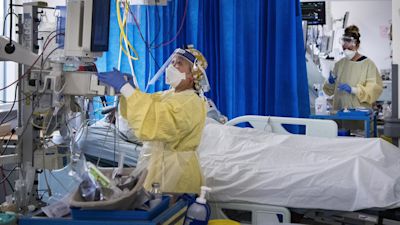Modelling predicts new Covid 'surge' with 'significant' number of deaths, Chris Whitty reveals

Video report by ITV News Health Editor Emily Morgan
There could still be a further 30,000 coronavirus deaths in the UK, models have suggested, despite the vaccination programme already having inoculated the vast majority the UK's extremely clinical vulnerable.
Chief Medical Officer Chris Whitty, speaking at the Science and Technology Committee, revealed modelling predicted a new "surge" in infections as restrictions are lifted.
He urged MPs not to get "too stuck on individual numbers" presented by models but agreed "this is not just a few people, these would be significant numbers of people who are dying".
"In an average flu year, 7,000 to 9,000 people would die, and in a typically bad flu year, up to 20,000 people would die - these are not ridiculous numbers, they are perfectly reasonable numbers for a significant respiratory virus."
Covid: Weekly coronavirus deaths in drops to lowest figure since Christmas, according to ONS
Adults aged 16-29 group 'most likely' to report Covid vaccine hesitancy
Models presented to the government's Scientific Advisory Group for Emergencies, said: "Under the most optimistic set of assumptions modelled, and assuming that baseline measures once restrictions are lifted significantly reduce transmission compared to a return to pre-Covid-19 behaviours, both groups estimate that at least a further 30,000 Covid-19 deaths would occur."
Modellers at the University of Warwick and Imperial College London were asked to assess how many people could die, based on assumptions that vaccines would prevent 70% of deaths after a first dose and 88% after a second dose.
Mr Whitty told MPs the modelling reflected the fact that it was a common virus and "even if you have a relatively small proportion of people still remaining vulnerable, that still equates to a very large number of people overall".
Chris Whitty on the '30,000 more deaths' model:
That might include people for whom the vaccine is not effective, those who do not take it or those in younger groups who have not yet been offered a jab.
"What we are going to see is, as things are opening up, what all the modelling suggests is that at some point we will get a surge in virus," he said.
"We hope it doesn't happen soon, it might for example happen later in the summer if we open up gradually or because of the seasonal effect it might happen over the next autumn and winter.
"All the modelling suggests there is going to be a further surge and that will find the people who either have not been vaccinated or where the vaccine has not worked.
"Some of them will end up in hospital and sadly some of them will go on to die."
As such, Mr Whitty said he would "strongly advise" against any move to shorten the timetable for easing lockdown restrictions.
Listen to the ITV News Coronavirus podcast
Downing Street, as it has done repeatedly, insisted lockdown will be eased "gradually".
Boris Johnson's official spokesman said: "We are gradually in a very cautious way moving through the road map so that we have the time between steps to look at the impact lifting restrictions has had.
"The prime minister has been clear it is a cautious road map but he wants it to be irreversible."
The PM revealed at Tuesday's coronavirus press conference that one third of the UK's entire population has so far been vaccinated.
Government data up to March 7 shows that of the 23,519,898 jabs given in the UK so far, 22,377,255 were first doses - a rise of 164,143 on the previous day.
Some 1,142,643 were second doses, an increase of 20,241.
Despite vaccine rollout, the government's chief scientific adviser Sir Patrick Vallance said achieving "zero Covid" would not be possible.
He told the committee: "I do not think that zero Covid is possible. I think there's nothing to suggest that this virus will go away, at least any time soon.
"It's going to be there, circulating. It may be a winter virus that comes back over winters with increasing infection rates during that period."
It would be very difficult for anywhere to keep cases out in the long-term "because at some point countries have to open up borders".